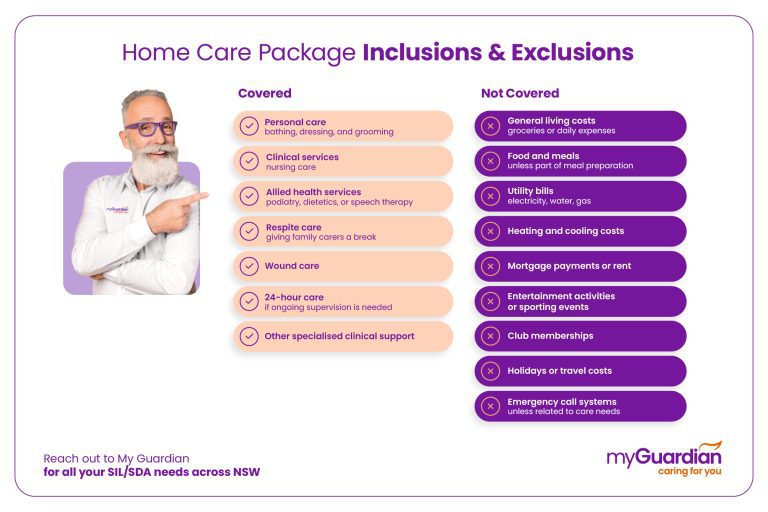All About Home Care Providers for Individuals With Disabilities: NDIS Registered Assistance
Home care services under the NDIS play a pivotal duty in supporting people with specials needs. These services are designed to improve everyday living with tailored support, ranging from personal treatment to movement support. Comprehending how to navigate these options can be complicated. This introduction explores the various facets of NDIS home care, from available services to the choice of suppliers, highlighting vital factors to consider for those looking for support. The trip towards equipped treatment begins right here.
Recognizing the NDIS and Its Objective
The National Impairment Insurance Coverage Plan (NDIS) serves as a transformative structure created to supply assistance and services for people with handicaps. Developed to enhance the lifestyle and warranty fair accessibility to vital sources, the NDIS encourages individuals by supplying individualized strategies tailored to their one-of-a-kind needs. It aims to foster self-reliance, allowing individuals to pursue their individual objectives and aspirations.Through a structured approach, the NDIS allots financing for numerous supports, including education, employment assistance, and neighborhood participation. This all-inclusive scheme not only focuses on prompt treatment but also emphasizes long-term developmental results. By advertising selection and control, the NDIS encourages participants to select their preferred solution suppliers, assuring that treatment straightens with their choices and worths. Ultimately, the NDIS stands for a considerable dedication to boosting the lives of people with impairments, fostering inclusivity, and building a more encouraging culture.
Kinds Of Home Treatment Services Available
Various sorts of home treatment services deal with people with impairments, mostly concentrating on individual care support and respite treatment options. Personal treatment help supplies important assistance with day-to-day tasks, while respite treatment offers temporary alleviation for primary caretakers. Comprehending these solutions is important for guaranteeing the well-being of both people with specials needs and their households.
Personal Treatment Support
While maneuvering life can present obstacles for individuals with specials needs, personal care aid uses crucial support tailored to their one-of-a-kind needs. This kind of home treatment solution encompasses a series of tasks developed to advertise freedom and improve quality of life. Individual care assistants assist with everyday tasks such as showering, dressing, grooming, and toileting, making sure individuals preserve personal health and convenience. They may additionally aid with meal prep work, drug management, and flexibility support. By offering individualized care, these professionals encourage people to involve more fully in their daily routines and social tasks. In general, personal treatment help plays a considerable role in promoting dignity and freedom for those with impairments, allowing them to grow in their home environment.

Reprieve Care Options
Reprieve care functions as an essential source for households and caregivers of people with handicaps, supplying short-lived remedy for the needs of day-to-day caregiving. This kind of service can take various types, including at home break care, where qualified experts see the home to aid with care jobs. Families might choose for facility-based break care, where individuals obtain care in a specific atmosphere, permitting caregivers to take a break. In addition, some organizations supply emergency situation respite solutions for unpredicted scenarios. These options not just aid relieve caregiver stress and anxiety however additionally promote the wellness of people with disabilities by using them new experiences and social interaction. On the whole, break treatment plays an essential role in sustaining both caregivers and those they take care of.

Exactly How to Accessibility NDIS Home Care Services
Accessing NDIS home treatment solutions involves comprehending the qualification criteria established forth by the National Impairment Insurance System. Individuals have to navigate an organized application process to protect the necessary assistance customized to their requirements. This section will clarify both the eligibility needs and the steps associated with looking for services.
Eligibility Criteria Explained
To receive NDIS home treatment services, people need to meet specific qualification criteria that assess their demands and circumstances. Initially, candidates need to be matured between 7 and 65 years and have a irreversible and substantial handicap that impacts their ability to do daily tasks. Furthermore, they have to be an Australian person, an irreversible local, or hold a Protected Unique Group Visa. The NDIS requires evidence of the special needs, generally via medical analyses or records. Furthermore, people must show that they require support to take part in social and financial life. These requirements guarantee that services are routed towards those that genuinely require help, advertising freedom and boosted quality of life for people with impairments.
Application Refine Actions
When picking a home treatment service provider for people with handicaps, it is important to consider different variables that guarantee the finest suitable for their special requirements. Evaluating the supplier's credentials and experience in serving individuals with comparable handicaps is crucial. This ensures that caretakers possess the needed skills and recognizing to deliver appropriate support.Next, family members ought to assess the range of services provided, in addition to the adaptability in treatment strategies, to suit transforming requirements. Communication is an additional substantial element; a provider that emphasizes clear discussion can promote a collective atmosphere in between caretakers and families.Furthermore, it is substantial to analyze the company's track record in the area, which can often be gauged through testimonials and reviews. Ultimately, the compatibility of caretakers with the individual must not be ignored, as a favorable rapport can enhance the overall treatment experience.
Financing and Budgeting for Home Care Services
How can households efficiently manage the monetary elements of home treatment solutions for people with disabilities? Understanding the numerous funding alternatives offered is necessary. The National Impairment Insurance System (NDIS) supplies financial backing customized to private demands, enabling family members to designate funds for necessary solutions. Families must evaluate their NDIS strategy, ensuring it aligns with needed home care services. home care providers.Developing a thorough spending plan can aid in monitoring expenditures and handling funds more efficiently. This budget plan must consist of expected costs for personal care, treatment, and break services. Furthermore, families need to check out various other financial aid programs click or subsidies that may be available at the state or regional level.Regularly assessing and changing the budget plan guarantees that households continue to be on track and can reply to any kind of changes in care needs. In general, positive monetary planning and resource understanding are crucial to properly taking care of home treatment solution prices
The Duty of Assistance Planners in NDIS
Support coordinators play a necessary duty in guiding the intricacies of the National Special Needs Insurance Coverage Plan (NDIS) for individuals with specials needs. They help participants in comprehending their NDIS strategies, ensuring they make notified options regarding their services and supports. Support planners aid browse the frequently detailed internet of available sources, connecting people to ideal carriers and solutions customized to their unique needs.Additionally, they help in creating approaches that improve individuals' self-reliance and community participation. By fostering collaboration in between different stakeholders, consisting of solution providers and relative, assistance planners create a natural support network. They additionally examine the efficiency and monitor of services, making essential adjustments to maximize outcomes for individuals. Ultimately, assistance planners encourage individuals to take control of their lives, advertising higher autonomy and a greater top quality of life within the structure of the NDIS. Their experience is very useful in assisting individuals accomplish their personal objectives and ambitions.
Tips for Maximizing Your Home Treatment Experience
What actions can individuals take to improve their home care experience? Initially, effective communication with caregivers is important. Individuals should openly reveal their worries, requirements, and choices to guarantee customized assistance. Establishing a regimen can also develop a sense of security and predictability, profiting both the individual and their caregivers.Another important idea is to continue to be proactively associated with the care plan. Routinely assessing and readjusting goals with assistance planners assures that services align with progressing needs. Furthermore, people ought to advocate for themselves, seeking information on services and revealing preferences.Building a rapport with caregivers fosters a trusting relationship, enhancing the general experience. Using readily available resources, such as area programs or assistance teams, can provide added support and social interaction. By taking these actions, individuals can maximize their home care experience, bring about improved well-being and complete satisfaction.
Regularly Asked Concerns
Can I Choose My Own Support Employees Via NDIS?
The individual asked whether they can select their very own support workers under the NDIS framework. Generally, individuals have the adaptability to choose support workers, fostering individualized treatment that lines up with their particular needs and choices.
What Takes place if My Requirements Modification After Getting Support?
They must connect these adjustments to their service company if a person's requirements change after getting support. Modifications can be made to the treatment plan, making sure that the support stays reliable and relevant for their conditions.

Exist Restricts on How Several Hours of Treatment I Can Obtain?
The individual asked about prospective restrictions on the number of treatment hours got. Usually, such restrictions might exist based on details policies or funding plans, stressing the importance of assessing contracts and guidelines regularly.
Can I Make Use Of NDIS Funding for Home Adjustments?
The inquiry of utilizing financing for home Recommended Site adjustments occurs frequently. Typically, individuals might utilize NDIS funding for required adjustments to their homes, making certain availability and security, contingent upon meeting certain eligibility requirements and standards.
Just how Do I Deal with Issues Concerning My Home Treatment Services?
To address grievances regarding home treatment solutions, individuals need to first document their worries. Then, they can communicate straight with their company, looking for resolution, or rise the issue to relevant oversight bodies if needed. Home treatment services under the NDIS play a pivotal role in sustaining people with specials needs. Numerous types of home treatment solutions cater to people with specials needs, mostly basics concentrating on individual treatment assistance and reprieve treatment choices. home care package providers. Individual care assistance provides vital assistance with everyday activities, while break treatment supplies short-term alleviation for main caregivers. Families might decide for facility-based break treatment, where people get care in a specific environment, permitting caretakers to take a break. How can families effectively manage the monetary elements of home care solutions for individuals with disabilities?
Comments on “Smart strategies for managing support at home needs efficiently”